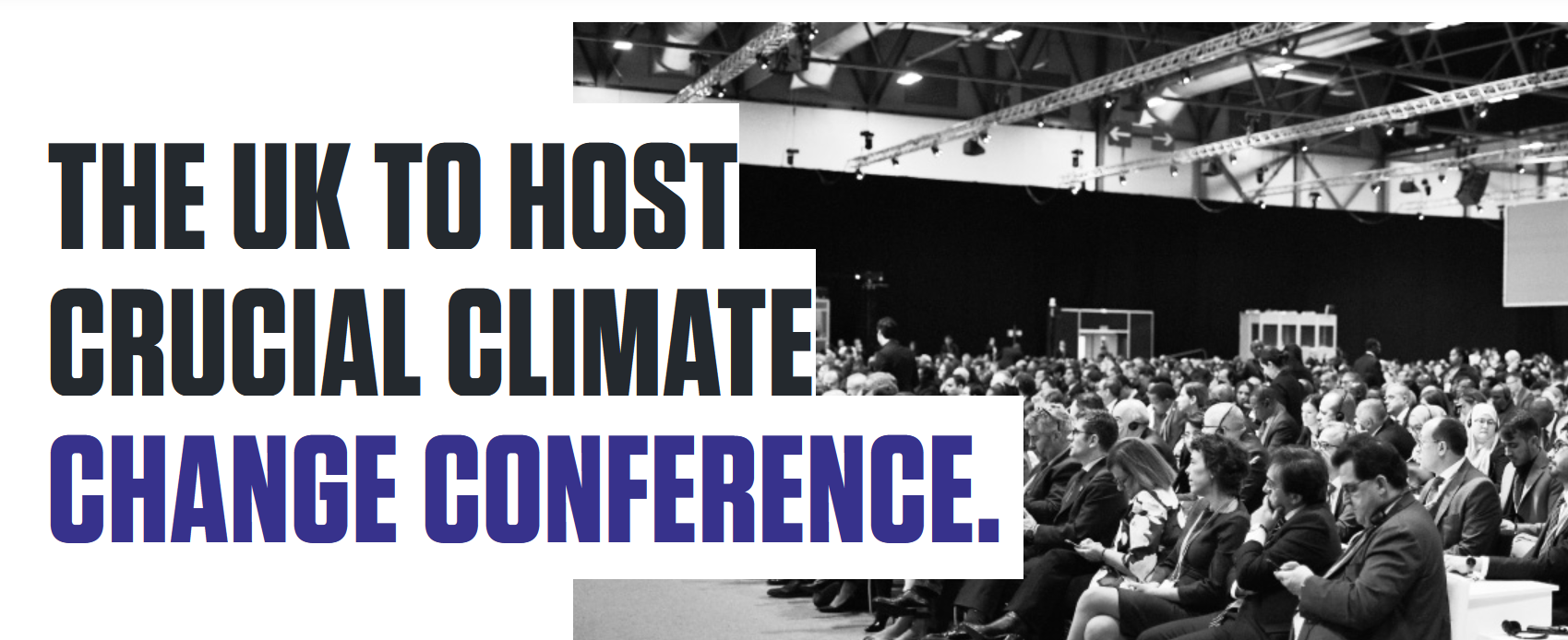
If we had not been currently living in the middle of a global pandemic, we would be two months away from the pivotal UN climate conference, known as COP26, which is being hosted by the British Government in the Scottish city of Glasgow.
However, due to COVID-19, the conference has been delayed a year, from 2020 until November 2021. Despite the delay, it is still a critical conference to get countries to agree to ambitious (and necessary) reductions in carbon emissions to tackle our climate emergency.
The website BusinessGreen explains that under the terms of the Paris Agreement in 2015, “nations had been expected to communicate more ambitious emissions reduction and climate adaptation plans – known as Nationally Determined Contributions (NDCs) in the UN jargon – by the end of 2020.”
If you log onto the official website for COP26, the British Government flags how important the conference is. “The climate talks will be the biggest international summit the UK has ever hosted; bringing together over 30,000 delegates including heads of state, climate experts and campaigners to agree coordinated action to tackle climate change,” it says.
The website adds: “The challenge is not insignificant, but we must step up to it to save the environment we all live in. The UN Climate Change process is central to that collective action.”
The COP 26 website even has a designated section entitled that 2020 is the “Year of Climate Action”. This states that “Tackling climate change is a key priority for the UK and our commitment to engaging individuals, communities and businesses to drive climate action remains.”
It continues: “This is a critical year for the future of our planet. We have an opportunity to make changes to stop the activities which are polluting our land, water and skies; impacting people’s lives, and making parts of our planet uninhabitable.”
These are fine words. But they hide a different reality.
The British Government, as hosts of COP26, had an opportunity to show real climate leadership and start a just transition away from fossil fuels. And a first step would have been to not offer any more drilling licenses to explore for oil and gas – fossil fuels we cannot afford to burn if we want a liveable future.
But despite the hype and the spin, the British Government is one dripping in climate denial. It is seen by Desmog as the most “anti-climate ever”.
British Prime Minister, Boris Johnson’s cabinet has extensive links to the network of think tanks which spread climate denial at 55 Tufton Street in London, such as the Global Warming Policy Foundation, which were the subject of protests by Extinction Rebellion and prominent writers such as Margaret Atwood and Zadie Smith this week.
Climate deniers do not take climate action. They carry on drilling.
And this week, the UK Oil and Gas Authority (OGA), the relevant Government authority, offered for award 113 licence areas over 260 blocks or part-blocks to 65 companies including the likes of BP, Shell and Total, in what is known as the 32nd Offshore Licensing Round.
The Government justifies this decision by stating that “forecasts point to oil and gas remaining an important part of our energy mix for the foreseeable future” and “maximising the economic recovery from the UK remains vital to meet those energy demands”.
Lets be clear about this, you cannot be a climate leader and carry on drilling.
As Greg Muttitt tweeted:
Today #COP26 host the UK awarded 113 new licenses to explore for and extract oil & gas, for 30+ years each. Our research has shown these are incompatible with the Paris agreement (https://t.co/aojrbuFeRG). https://t.co/iJmzSVJVqU
— Greg Muttitt (@FuelOnTheFire) September 3, 2020
As Greg points out, last year OCI published a report, Sea Change, along with Platform and Friends of the Earth Scotland. The report concluded that “a well-managed energy transformation based on Just Transition principles can meet UK climate commitments while protecting livelihoods and economic well-being, provided that the right policies are adopted.”
One of those policies is to “stop issuing licenses and permits for new oil and gas exploration and development, and revoke undeveloped licenses,” at the same time as “open formal consultations with trade unions to develop and implement a Just Transition strategy for oil-dependent regions and communities.”
The simple fact is that the UK cannot carry on drilling. Sea Change outlined how: “The UK’s 5.7 billion barrels of oil and gas in already-operating oil and gas fields will exceed the UK’s share in relation to Paris climate goals, whereas industry and government aim to extract 20 billion barrels.”
There can be no climate equity if rich nations just carry on drilling and exploit every last drop of oil. This is climate hypocrisy at its worst.
And if the organisers of the UN climate conference, the ones that are meant to be leading the way when it comes climate action, just continue to drill, what hope do we have of solving our climate crisis?

